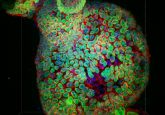NICE recommends new first-line treatment Lenvima against advanced liver cancer

The National Institute for Health and Care Excellence (NICE) has issued a final appraisal document (FAD) recommending the use of Lenvima® (lenvatinib) on the National Health Service (NHS) in England and Wales as an option for untreated, advanced liver cancer. This represents the first new, first line treatment for advanced liver cancer in a decade.
Hepatocellular carcinoma (HCC) is the most common type of primary liver cancer, accounting for 90% of cases, most often in people with chronic liver diseases. Treatment options for HCC, unresectable by surgery, are limited and the prognosis for patients is bleak.
Lenvima is an oral receptor tyrosine kinase inhibitor and the first new, approved first-line treatment for advanced HCC in a decade to show an overall survival treatment effect non-inferior to sorafenib, the current standard, based on results from 954 patients in the open-label Phase III trial, REFLECT (Study 304). According to kinetic analysis in pre-clinical models, it exhibits rapid and potent inhibition of kinase activity. Given this, NICE has issued a FAD recommending its use on the NHS in England and Wales.
“Patients with HCC, the most common form of primary liver cancer, have a 5-year survival rate of only 12% and a diagnosis is truly devastating for patients,” explained Judi RhysBritish Liver Trust (Bournemouth, UK).
“NICE’s approval of lenvatinib in the first-line setting is therefore a significant step for patients across England and Wales who have had very limited treatment options in the past. We look forward to other parts of the UK considering access to this important new therapy.”
Phase II and III studies of Lenvima are ongoing for renal cell carcinoma, non-small cell lung cancer and endometrial cancer. Lenvima was also recommended by NICE for the treatment of differentiated thyroid cancer, thereby extending treatment choice for patients.
Daniel Palmer, University of Liverpool (UK) commented: “The diagnosis of advanced HCC in a patient is challenging for the patient and their clinicians, since we are limited by the treatment choices available. This new option will allow us greater flexibility in managing patients who may not be suitable for other treatment options.”
Source: Nice recommends new first-line treatment Lenvima®(lenvatinib) for adults with untreated, advanced, unresectable hepatocellular carcinoma. Eisai. EMEA-LENB-18-00022 (2018); www.nice.org.uk/guidance/indevelopment/gid-ta10150/documents





